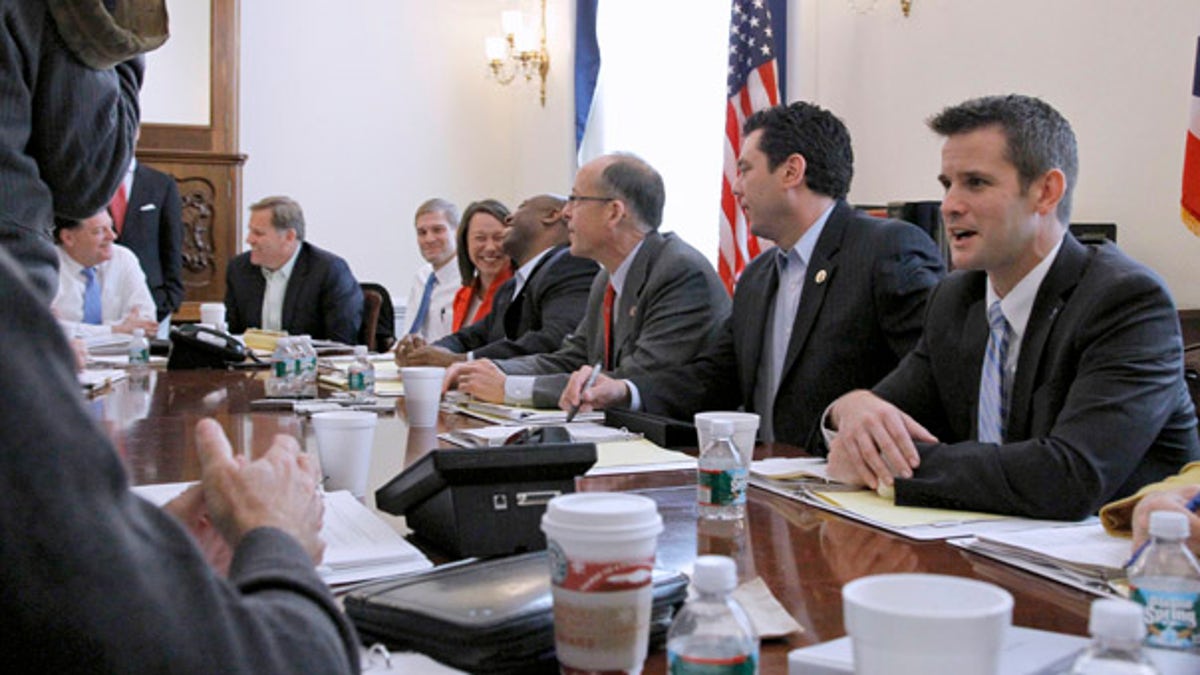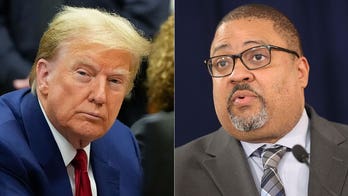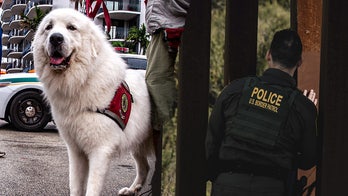
Nov. 9: Republican Majority Transition team members, from left, Rep. Tom Cole, R-Okla.; Rep. Mike Rogers, R-Mich.; Rep. Jim Jordan, R-Ohio, Rep.-elect Martha Roby, R-Ala.; Rep.-elect Tim Scott, R-S.C.; chairman Rep. Greg Walden, R-Ore.; Rep. Jason Chaffetz, R-Utah, and Rep.-elect Adam Kinzinger, R-Ill., talk during a photo opportunity on Capitol Hill in Washington. (AP)
WASHINGTON -- The midterm election may be over, but the in-fighting that dominated debate about the differences between Tea Party conservatives and establishment Republicans flared again Sunday as incoming lawmakers arrived in Washington for orientation.
Republican lawmakers-elect began entering town Sunday morning for courses meant to ease their transition from private citizen to public official. They are expected to attend GOP-hosted classes at the Capitol Hill Club designed to go over issues like ethics, House rules, blackberry usage and the bell-ringing system to call House votes, among other mundane functions.
House Republican Leader John Boehner, the presumptive speaker of the next House, welcomed newly elected congressional members with a letter commending them for the initiative to meet ahead of the lame-duck session that will pull the current Congress back to town this week.
"Your class colleagues will be a great source of support, inspiration and friendship in the months ahead as the new majority gets to work on the priorities of the American people," Boehner wrote. "I look forward to the honor of serving with you in the 112th Congress as we begin a new drive for smaller, less costly, more accountable government in Washington. See you Sunday night."
But in the midst of their arrival, the new class found itself smack in the middle of a series of hostile exchanges by sponsors of other overlapping events, and the incoming group of 60 Republicans is unexpectedly finding its loyalties questioned by other influential parties.
The Tea Party Patriots, which has the backing of FreedomWorks, the Leadership Institute and other organizations that helped bankroll and campaign for up-and-coming Tea Party candidates, late last week accused GOP leadership and its sponsor, the conservative Claremont Institute, of holding the Capitol Hill Club function to indoctrinate new members into Washington's unhealthy habits.
TPP then inflamed lawmakers by publishing personal information of the new class. That came about after the TPP, which states it wants to prevent its revolutionaries from being co-opted by establishment Washington, wrote its membership urging them to contact the newly elected members and complain that the Tea Partiers were being manhandled by Beltway insiders.
"We need you to call & e-mail these incoming Congressmen & tell them you want them to attend YOUR Tea Party Patriots event," reads the e-mail notice to TPP members. "Or would you rather they attend an indoctrination organized by DC insiders and lobbyists, members of The Ruling Class?"
That move angered Rep.-elect Bill Flores, who beat Chet Edwards for the Texas House seat. Flores called the Tea Party Patriots "disruptive" and said he was going to the Capitol Hill Club because it was important to meet fellow freshmen.
"The TPP's tactics were inappropriate -- the posting of our private cell phone numbers and e-mail addresses along with the trashing of the Claremont Foundation's reputation were not professional actions and they were disruptive to our individual efforts to have effective transitions into our elected offices," he said.
But the action also apparently alarmed sponsors of a "Constitutional Congress," hosted by three current lawmakers, retiring Rep. John Shadegg of Arizona and Sens. Tim Coburn of Oklahoma and Jim DeMint of South Carolina. They reportedly had planned their event as part of the Tea Party Patriots event, but separated themselves after learning of the conflict.
To avoid the mess, some new members said they would try to hit all three events. That started when a group of freshmen turned up at the Constitutional Congress to hear Shadegg, a member of the class of 1994, discuss the mistakes those GOP revolutionaries made.
Waves of freshmen, including Reps.-elect Kristi Noem of South Dakota, Tom Graves of Georgia, Billy Long of Missouri and Marlin Stutzman and Todd Young of Indiana, also heard from DeMint, who urged the group to be more than "rhetorical gadflies" and to put their principles into legislation.
"We've got overlapping events, we have got a lot of demands on our time. I'm going to try to be at as much of everything as I can," said Rep.-elect Bill Johnson, R-Ohio., one of the first new lawmakers to arrive in town.
Rep.-elect David Schweikert of Arizona added that none of the organizers need to worry about the new class going astray from its fundamentals because the freshmen are "firebreathers" who are just trying to divvy up their time to be most effective.
"On some evenings there are four or five activities all going on at once. And you're doing your best to choose what fits what you need to learn," he said.
Schweikert, who has offered to abide by term limits and said he doesn't plan on doing the "cocktail game," added that none of the freshmen came to Washington with any interest in making friends with lobbyists.
"One of the fun things, and my wife keeps commenting on this, is how many new best friends we've had since Election Day," Schweikert said.
Rep.-elect Tim Walberg, R-Mich., one of several past members who lost their seat and then won re-election this year, said he's not going to attend any of the gatherings because he's technically not a freshman.
A Little Bit of This and a Little Bit of That
As if office politics weren't enough to unsettle the recently elected, they soon could potentially witness the Republican Party go through another upheaval as Republican National Committeeman Saul Anuzis tries to unseat Michael Steele as chairman of the Republican National Committee.
Anuzis, who made the announcement on Friday, released an e-mail on Sunday saying his decision to run against Steele -- as he did unsuccessfully in 2009 -- isn't about "firing someone, it's about hiring a new chairman to run the party under very different circumstances."
"I believe now, more than ever, we need a 'nuts and bolts' kind of chairman who will make sure the trains run on time and can raise the money necessary" to implement the best get-out-the-vote programs nationwide.
While several Republicans have suggested Steele be put out to pasture for gaffes and questionable financial decisions, the chairman has said GOP turnover this election and his work on the campaign trail make him worthy of another two-year term.




